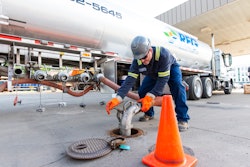In a hearing before the House Committee on Transportation and Infrastructure Thursday, Transportation Secretary Pete Buttigieg mentioned "user fees" as a possible source for infrastructure funding, and that he was "very open" to a potential national vehicle miles traveled (VMT) tax as a source of funding for the Highway Trust Fund (HTF).
The HTF – the primary source of federal funding used by state governments to maintain and improve roads – is funded currently almost exclusively by a per-gallon excise tax on gasoline and diesel fuel. The current federal fuel tax rates of 18.4 cents on gas and 24.4 cents on diesel were last increased in 1993. Since then, improvements in vehicle miles per gallon, combined with inflation over that 28-year span, have undercut the HTF's ability to adequately fund roads projects and the roughly $40 billion fund has faced annual shortfalls for more than a decade.
[Related: Diesel prices hit highest national average since 2018]
Last February, several U.S. Senators proposed a VMT tax exclusively on trucks. VMT has long been seen as a more consistent stream of funding, especially as the nation begins its shift to electrified vehicles that would circumvent a fuel tax entirely.
However, a report compiled by the American Transportation Research Institute found that costs associated with implementing a VMT tax could far exceed any revenue gains.
 ATRI
ATRI
“It’s clear that a VMT tax is a far more complicated and costly replacement for the fuel tax than many had anticipated,” said James Burg Trucking Company President and CEO Jim Burg. “If a system like this is going to work for everyone, many years of thoughtful planning and federal leadership are needed.”










